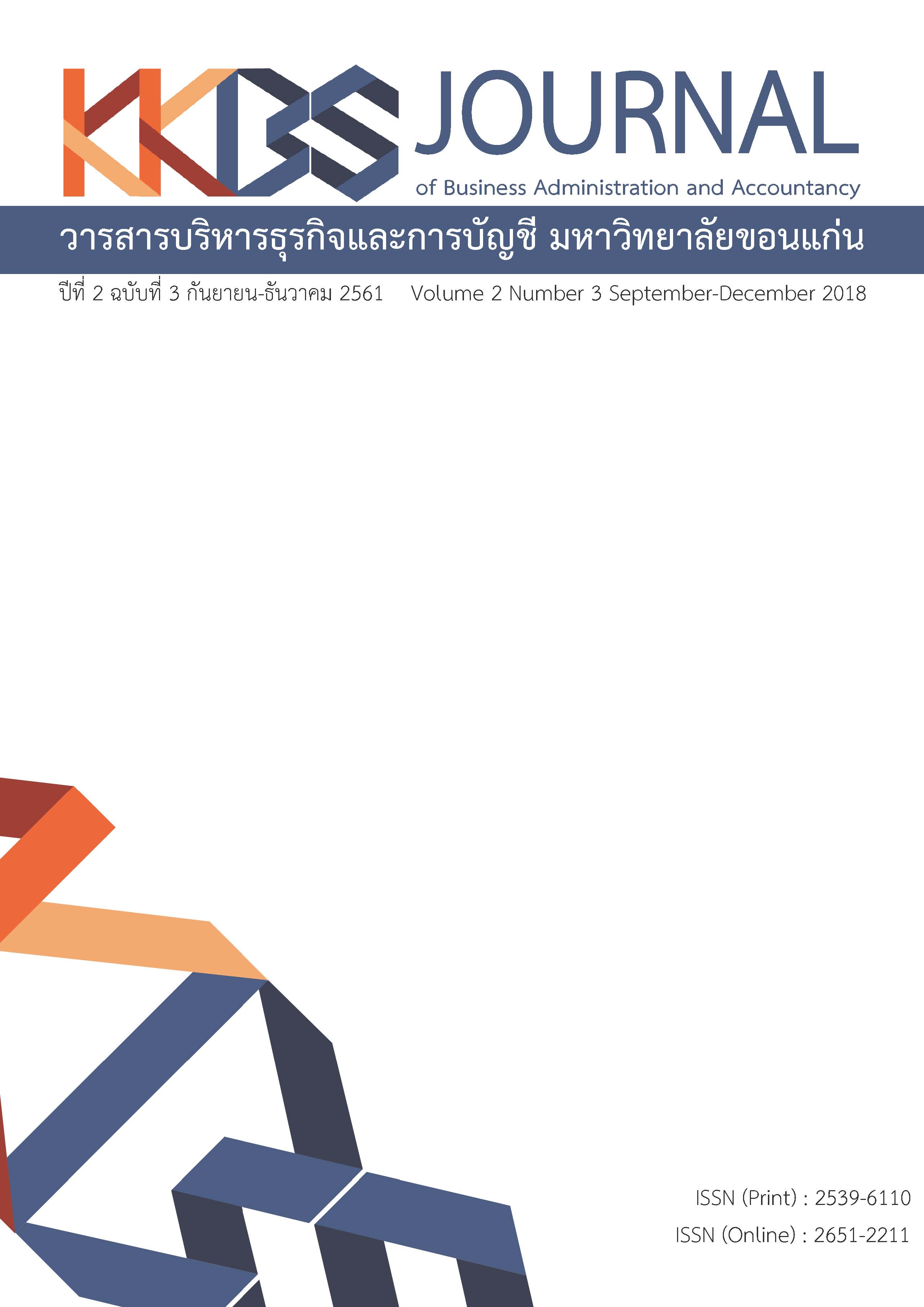The Relationship between Organizational Culture and Balanced Scorecard
Main Article Content
Abstract
The purpose of this research is to investigate the relationship between organizational culture following the I-SURE and organizational effectiveness based on Balanced Scorecard, and the difference of organizational culture (I-SURE) and Balanced Scorecard in different work periods. A questionnaire was applied as a research instrument for data collection. The data was analyzed by using statistics of Pearson’s correlation coefficiency and t-test. The results revealed that the I-SURE consisted in integrity, service mind, unity, result orientation, and change capability correlated with Balanced Scorecard. The difference of work period had not significant difference in the I-SURE and Balanced Scorecard.
Article Details
The articles published in the journals are the authors' opinions, not the opinion of the editorial team or administrative staff. The articles published is copyright of the Journal of Business Administration and Accounting, Khon Kaen University.
References
ฐานปนา ฉิ่นไพศาล. (2559). องค์การและการจัดการ. กรุงเทพ: ธนธัชการพิมพ์.
ณรงค์วิทย์ แสนทอง. (2553). วัฒนธรรมองค์กร คุณค่าที่ซื้อหาไม่ได้แต่สร้างได้. นนทบุรี: บริษัท ไอดีซีพรีเมียร์ จำกัด.
นิรมิต เทียมทัน. (2555). BALANCED SCORECARD และยุทธศาสตร์การบริหารจัดการ. กรุงเทพฯ: ส.เอเชียเพลส (1989).
นุกูล ชูทอง และชัชวาล อรวงค์ศุภทัต. (2559). ประสิทธิผลองค์กร. นนทบุรี: ไอดี ออล พริ้นท์.
บริษัท ไปรษณีย์ไทย จำกัด. (2559). หนังสือเผยแพร่สายงานบุคคลบริษัท ไปรษณีย์ไทย จำกัด. กรุงเทพฯ: บริษัทฯ.
บริษัท ไปรษณีย์ไทย จำกัด. (2559). รายงานประจำปี 2559. สืบค้น 26 มกราคม 2561, จาก https://www.thailandpost.co.th.
บุญชม ศรีสะอาด. (2554). การวิจัยเบื้องต้น. กรุงเทพฯ: สุวีริยาสาส์น.
ประเวศน์ มหารัตน์สกุล. (2560). กลยุทธ์การวางแผนและการจัดการ. กรุงเทพฯ: ส.เอเชียเพรส (1989).
พิพัฒน์ ก้องกิจกุล และณัฐยา สินตระการผล. (2549). Balanced Scorecard ภาคปฏิบัติ: วิธีสร้างสมดุลระหว่างกลยุทธ์และการควบคุม. กรุงเทพฯ: เอ็กซเปอร์เน็ท.
พีรญา ชื่นวงศ์ และวิชิต อู่อ้น. (2558). การวิเคราะห์ปัจจัยภายในองค์กรที่ส่งผลต่อประสิทธิผลองค์กรของธนาคารพาณิชย์ในประเทศไทย. วารสารสังคมศาสตร์วิชาการ, 8(1), 1-14.
รังสรรค์ ประเสริฐศรี. (2556). พฤติกรรมองค์การ. นนทบุรี: กรีนแอปเปิ้ล กราฟฟิค พริ้นติ้ง.
รุ่งนภา ปฐมอัมพร และวิโรจน์ เจษฎาลักษณ์. (2556). อิทธิพลของการรับรู้การสนับสนุนจากองค์กรที่ส่งผลต่อประสิทธิผลในการปฏิบัติงานของพนักงานตามแนวคิด Balanced Scorecard (BSC). วารสารการวิจัยเพื่อพัฒนาชุมชน, 6(2), 75-85.
วนิดา วาดีเจริญ และคณะ. (2560). ระเบียบวิธีวิจัยจากแนวคิดทฤษฎีสู่ภาคปฏิบัติ. กรุงเทพฯ: ซีเอ็ดยูเคชั่น.
วิเชียร วิทยอุดม. (2556). พฤติกรรมองค์การ. นนทบุรี: ธนรัชการพิมพ์.
สมชนก (คุ้มพันธุ์) ภาสกรจรัส. (2559). การจัดการเชิงเปรียบเทียบ/การจัดการข้ามวัฒนธรรม. กรุงเทพฯ: ส.เอเซียเพรส (1989).
สมชาย หิรัญกิตติ. (2560). พฤติกรรมองค์การ. กรุงเทพฯ: ธรรมสาร.
สุดารัตน์ โยธาบริบาล. (2554). วัฒนธรรมองค์การกับผลสัมฤทธิ์การดำเนินงาน อำเภอเมืองนครปฐม. วารสารวิทยบริการ, 22(2),
100-125.
สุทิติ ขัตติยะ และวิไลลักษณ์ สุวจิตตานนท์. (2553). แบบแผนการวิจัยและสถิติ. กรุงเทพฯ: เปเปอร์เฮ้าส์.
Deem, J.D. (2009). The relationship of organizational culture to balanced scorecard effectiveness. (Doctoral Dissertation). Nova Southeastern University. Retrieved March,10 2018, from https://nsuworks.nova.edu
Kaplan, R.S. & Norton, D.P. (1992) The balanced scorecard: measures that drive performance. Harvard Business Review, 70(1), 71-79.
Soleimani, F. (2012). Employee involvement is the prime organizational culture trait influencing balanced scorecard effectiveness in the hospitals: evidence from a correlation study. International Journal of Hospital Research, 1(2),
117-120.


